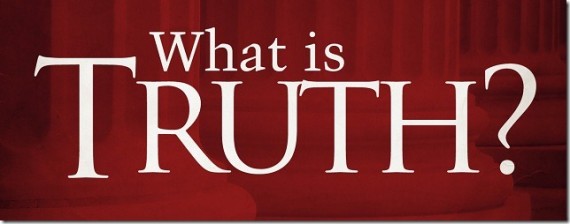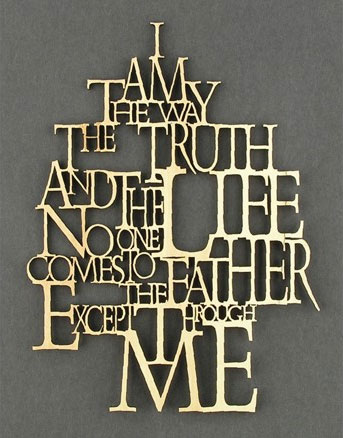
If you have a doctrinal statement, do you believe it represents truth?
Of course you do, or you wouldn’t believe it.
Your Doctrinal Statement is Not the Truth
But we must be careful. While truth can be found in doctrinal statements, they themselves are not the source of truth. They point and witness to the truth, but are not themselves “the truth.”
Let me put this another way. Everybody who has a doctrinal statement believes that their doctrinal statement accurately represents the teaching of Scripture. But since not all doctrinal statements agree, this means that not all doctrinal statements accurately represent the teachings of Scripture. Some points on some doctrinal statements must be wrong, and we must not be so arrogant to think that our chosen doctrinal statement is 100% accurate, while everybody else is in error.
It should be pointed out that the same goes for Scripture. When we say that our doctrinal statements just follow the teachings of Scripture, what we really mean is that our doctrinal statements follow our understanding of Scripture. Yet our understanding of Scripture may not be the actual teachings of Scripture in every case.
The Nature of Truth
This brings us to the nature of truth. While I do think that there are some things we can know with absolute certainty, I think that several ideas found on most doctrinal statements do fall into this category. And yet, because they get written into a formal “doctrinal statement” the words of the statement become set in stone, and soon, we become slaves to the statements. They surround us with walls and bind us with chains until we are no longer free.
It is much better, I believe, to think of truth not as something that has been achieved and can be summarized on a piece of paper, but as a target to shoot for, or a goal to accomplish. Truth is not something that we have already obtained, but something that we strive for.
And what is at the center of this target? What is the goal that we strive for? What is the truth?
What is the Truth?
 Simply this: the truth is Jesus Christ. He is the Way, the Truth, and the Life. In Him is Truth.
Simply this: the truth is Jesus Christ. He is the Way, the Truth, and the Life. In Him is Truth.
Some like to point to John 17:17 as proof that Jesus wants people to look to Scripture as the primary source of truth. In this verse, Jesus prays that God will “Sanctify them by Your truth. Your word is truth.” But in the surrounding context, and in the Gospel of John as a whole, Jesus is identified as “the Word” from heaven which has come into the world, the Word from God which has revealed God’s truth.
Jesus is the truth. Jesus is the focus. Jesus is the target. Jesus is the goal.
Jesus.
You want to center your life and ministry on truth? Center it on Jesus.
I don’t mean that our doctrinal statement should emphasize Jesus. This is just doctrinal sleight of hand where we substitute Jesus for ideas about Jesus, and think they are same. They aren’t.
We must be centered, not around a statement, but around a Savior. Not around a creed, but around Christ.




Well, God’s written word is the truth as well and, insofar as a given doctrinal statement reflects the truth of God’s word, the doctrinal statement is also the truth.
Terry,
Yes, you are right. But what so often happens is that we write a doctrinal statement, and then we think it is the truth, rather than recognizing that it is our interpretation of the truth of Scripture. There is a very fine balance to maintain…
Terry,
Exactly that.
Jeremy,
Everything every believer thinks, says or writes on Scripture is their “interpretation of the truth of Scripture”; that’s the nature of the beast that is man. God will determine those of us who interpret correctly and follow the narrow Way to Life and those who won’t. All your post-modernist angst and posing is doing is making swirly tautological pretzels out of self-evident common witness.
Jesus is Truth, yes, but you need to form that Truth into doctrine in order to pass it on to the sheep; those who already know they’re sheep and the ones who aren’t yet awake to that fact.
Jeremy….YES! YES! YES!!!
In case you couldn’t tell, I like this post. 🙂
Thanks! I hope to clarify more on this in future posts.
For a moment I thought perhaps we were going to have a discussion on perhaps Socrates’ or Aristotle’s ideas about truth. But you hit the bulls eye. Jesus is THE truth. However, the imperfect creatures that we are, we will not all interpret and understand that exactly the same.
Nope. I will provide some ideas on how to handle this inevitable disagreement in today’s and tomorrow’s posts.
Very well put, Jeremy. I like the way you take the nail and hit it squarely on the head… with one mighty stroke. It’s good to read posts that aren’t wishy-washy.
Thanks!
Thank you, Jackie.
“… the truth is not some obscure, mystical thing. The truth is nothing less than reality itself. And reality is what there is.” Palm Wednesday by Attila B. Magyar. My article /underlying Palm Wednesday/ “How Could Jesus Spend Three Days and Three Nights in the Tomb?” (available on the web, viewed by over 3,000) contains a kind of “doctrinal statement” on 3 days and 3 nights (Tuesday crucifixion and Friday resurrection) and I think it can be regarded as valid until someone refutes the findings and evidence contained in it. No one has refuted my findings as yet. No one has validated them. No one has commented on them. Strange at least.:-)
Sandor,
I am one of those 3000. I think it’s fun to talk about which day Jesus died on the cross, but for me, I don’t care as much about which day He died, as much as the fact that He did die and what His death means for all of us.
Jeremy,
Thank you for reading my article.
Jeremy,
You write it’s fun to talk about which day Jesus died. There is an article entitled “The Case for a Thursday Crucifixion” (implying a Saturday resurrection)available at this site… Fun?
Maybe “fun” wasn’t the best choice of words…
Jeremy,
I have no problem with the word ”fun”. What I mean to say is that your article ”The Case for a Thursday Crucifixion” also addresses the issue of 3 days and 3 nights. Do you have the intention and/or possibility to publish or at least mention, by providing a link, my article ”How Could Jesus Spend Three Days and Three Nights in the Tomb?” for comments? If so, I’m ready to give you the relevant link.
Sandor,
You can do that yourself if you like. I do not mind my readers sharing their posts in the comments section of the blog. Put it up in a few places if you like. Just try to make sure that it generally fits with the theme and content of the blog post.
Thank you, Jeremy, for the generous offer. However, I don’t want to cause any unnecessary inconvenience by posting an with a word count of about 7,000. I would just mention its title for the last time, and wouldn’t put it up now, nor later on, in any other places here. Those (or even the one:-)) who may be interested in the topic can read it throughout the web: “How Could Jesus Spend Three Days and Three Nights in the Tomb?” I’ll be pleased to receive and answer any question and/or comment. I do appreciate your attitude.
Sandor,
No, don’t post the . Yikes! Thank you for not doing that. Just Post a link to it. A web address.
Very good, Jeremy…I appreciate your writings. This reality of Truth being a Person has been very real to me over the years. One intriguing thing about truth being a Person is that you can’t manipulate it nearly as easily as you can when you relate to it as words on a page. Words on a page can be made to say almost anything you want, if one is clever enough. Relationship with the person of Jesus as Truth is an entirely different relationship with truth.
Nita,
That is a good thought. Such a view of Truth helps us go to Jesus to learn it, rather than to a book, a doctrinal statement, or even a religious authority. Certainly Jesus can teach us more about Himself in all of these arenas, but we need to remember that He is the Truth.
I agree – before I became a christian, I was studying science and let my thoughts follow what I thought was the truth (I now believe that God was guiding my thoughts) – what a delight to find that truth is a person, Jesus!
CS Lewis was an atheist before he became a Christian, and he said that people who are not Christians cannot be too careful about what they read or where they go or what they think about, because God is trying in every way possible to lead their thoughts to Him.
The Greek word for truth, aletheia, incorporates the word for “forgetting”; a-letheia might be translated as “unforgetting” or “remembering.” I’m forever fogetting stuff I read or have to do and so I write notes or re-read something, especially scripture. However knowing the truth is more about knowing the person Jesus – it’s an encounter that transforms and shapes your life. Science has for a few hundred years been shaped by the notion that everything can be measured or defined by clear rules but quantum physics is not like that. Just when you had an idea tied down like E=mc2 an experiment shows that you can travel faster than light. So what? Well, we may think that truth is measurable and clearly defined until we meet the author again, who may take us in a completely different direction. Let’s learn to trust in Him.
Aims,
What a great comment! Yes, Jesus has a habit of leading us in direction we never thought possible. As you say, just we think we have truth nailed down, Jesus shows up and throws a little wind at our house of cards, and it all comes tumbling down!
Aims – Yes, a great comment! Jesus is the truth. Knowing Jesus is knowing the truth. Our understanding of everything else, including Scripture, theology, science and so on is subject to change, as has been clearly demonstrated again and again. Just imagine – If the human race is still around in a thousand years and we were somehow able to listen in on a discussion regarding what we now think is true in all of these areas, I’m guessing there would be lots of chuckling about our “primitive” ideas. Hmmm!
Hmmmm is right.
We need to be careful about what CS Lewis calls “Chronological Snobbery” where we think we know better simply because we are further along the timeline than those who came before us, but at the same time, there is something to be said about progressive revelation.